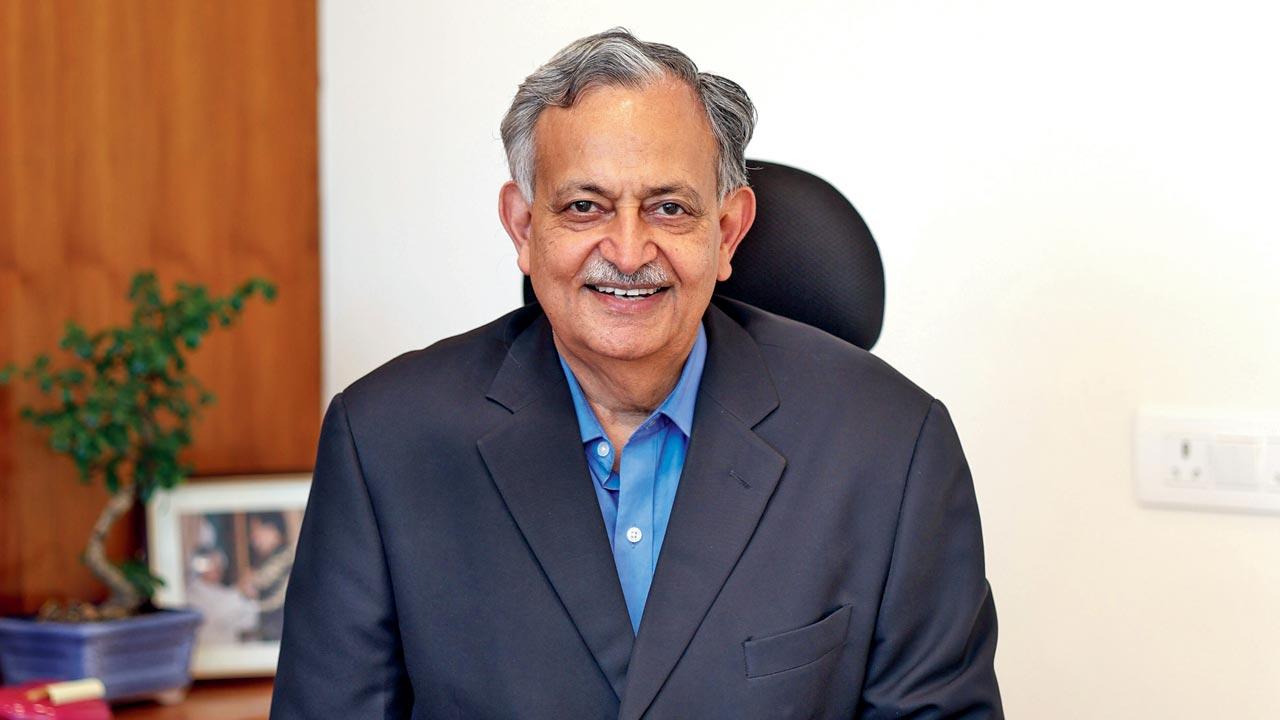In his enlightening new book, Dr Shiv Kumar Sarin discusses what Indian families won’t: How adults who abuse their body are contributing to a diseased next generation via defective genes. And that the young are dying of cardiac arrests not only because of the exhausted heart, but also the burdened liver

From fatty liver, to obesity through genetic impediments, Dr Sarin’s book argues for preventive as opposed to correctional healthcare,
Hepatologist and gastroenterologist Dr Shiv Kumar Sarin has observed, studied and corrected countless liver-related problems over a career spanning four decades. But it’s matters of the heart that our conversation begins with. The country is witnessing an abnormal surge in cardiac episodes among young Indians aged 20 and 40—a problem, that Dr Sarin argues is connected to the human liver. “Yes, the numbers are abnormal. Because people with fatty livers don’t die of liver diseases. They die of cardiac events,” he says. The way to a man’s heart, is through his stomach, after all.
ADVERTISEMENT
The Director of Delhi’s Institute of Liver and Biliary Sciences and Padma Bhushan awardee, Dr Sarin has recently authored the book Own Your Body: A Doctor’s Life-saving Tips, with which he tries to package scientific rigour to produce a cultural manual for life and longevity. The title, tells us, is the gist.
Dr Sarin’s book is divided into sections that deal with categorical ailments. From fatty liver, to obesity through genetic impediments, it argues for preventive as opposed to correctional healthcare. “Education is a giant gap that requires our urgent attention. We don’t know what is good for us, or how to take responsibility for our own bodies. Institutions can only provide policies and framework,” he adds. His opinions are endowed with not just elite medical experience spanning decades, but also socio-political nuance. In his book, for example, he repeatedly makes the case for protecting your progeny, highlighting the potent fact that parenthood is first a social responsibility, and then a self-fulfilling undertaking.
 Gastroenterologist Dr Shiv Sarin is a Padma Bhushan awardee and Director of Delhi’s Institute of Liver and Biliary Sciences. Pic/Nishad Alam
Gastroenterologist Dr Shiv Sarin is a Padma Bhushan awardee and Director of Delhi’s Institute of Liver and Biliary Sciences. Pic/Nishad Alam
Most of our medical burdens are genetically passed on. Unhealthy parents, the doctor argues, will produce unhealthy children. “It’s a crime,” he declares, “Defective genes can only produce children who will have to work overtime to survive inherited defects. It should be mandated, at least culturally, to first become fit and then consider extending the family tree. Otherwise, you are sentencing a human to a life of medical strife for no fault of his or her own.” In the most populated country in the world, this conversation rarely features in familial discourse.
There is an argument here about the contrasting lifestyles between India’s so-what second generation and urban millennials, who though self-conscious, are incidentally showing greater signs of fatigue and medical vulnerability. “The lifestyle isn’t good,” Dr Sarin declares, “You might eat selectively, but then you must also consider health-building habits like getting restorative sleep and breaking cycles of alcohol abuse. Because there is no such thing as a good amount of alcohol. All of it, whatever quantity or form, is bad for you.”
But are Indians doing worse on the global health index? “Not really. Obesity and fatty liver are as big lifestyle-induced problems in the US and Europe as they are in India. Eight out of 10 officers in the FBI are, for example, overweight. What makes Indians unique is maybe the fact that we are an old ancestral race. Unhealthy genes have thus been passed over and circulated wider compared to other gene pools,” he explains.
Dr Sarin has written Own Your Body to simplify the approach to preventive health habits. Medicine remains your last resort. But in the matters of the gut, he argues, it’s mostly down to the choices we make and most importantly, the ones we don’t. In the book, he repeatedly compares the human body to a car. A machine we take great care of like it was a living thing. “We are calculative about what vehicle to buy, how to maintain it, how to ensure it looks good, but we don’t attribute the same value to our bodies. It’s bizarre, really. Culturally, that’s the problem. We need to think of our bodies as a value proposition, as this thing that we should be proud of handling, showcasing and caring for,” he says.
Across the book and the conversation with mid-day, Dr Sarin gives the impression that the liver is the most abused organ of the body. It must support desire, generate fuel and also accommodate the corrective measures of last-resort medical care. We after all prefer popping pills acquired over the counter compared to the discipline of monitoring and consultation. Everyone’s a doctor until they aren’t.
Own Your Body wears its message on the cover. Inside, it builds carefully collated evidence to support the emergence of a new self-consciousness. Rather than devices, we need to reconsider our body as every day conquest; one that requires both ministration and self-love. Because most people in the know of material inheritance learn of the medical wills written down to them far too late in life. “A 17-year-old boy was sitting in the chair that you are sitting in last week,” Dr Sarin tells this writer, “he weighed 140 kg. He told me he felt like eating all the time. His father died years ago because of cardiac arrest. You can connect the dots. We need greater sensitisation. Health should really be your first education.”
Dr Sarin’s life-saving observations
Your tummy width matters
Central obesity is a good indicator of metabolic health and fatty liver, associated with liver cancer development in Asian and other populations. You should measure your waist circumference at the level of the belly button. Do it after exhaling, but don’t cheat by contracting the abdomen. Measure the largest diameter of the hip at the level of the buttocks. Then simply determine the waist-to-hip (WH) ratio. Say, for instance, if the waist is 100 centimetres and the hip is also 100 centimetres, the ratio will be 1. If it’s beyond the healthy limit, work to correct it.
Don’t overdose on tablets
Tuberculosis (TB) medicines are generally given for six months. A small proportion of patients get jaundice and liver injury from them, especially those who have low nutrition or already have a weak liver. The same can be true of long term use of steroids, which can lead to the accumulation of fat in the liver. There can be a different scenario too. Some people get severe reactions and liver injury even with a single dose of painkillers or antibiotics. Hence, it is worthwhile to remember to take medication only if you think your body cannot get well by itself. I can visualise some of you nodding with me.
Let not your body be adulterated with medicines. Certain physicians are fond of writing a long list of drugs, one for each symptom or complaint of the patient. That is not always scientific. Drug therapy should be specific for the ailment as far as possible. If you are taking any medicine and there is a loss of appetite or a feeling of nausea, or if the colour of the urine becomes yellowish, do get a liver panel done and consult the treating doctor.
Parents, go easy on the tipple
Parents should not close their eyes to the ill effects of prolonged alcohol use on the psyche of their children. Moreover, as per the US National Center for Biotechnology Information, alcoholism is a genetic disease and children of alcoholics are significantly more likely to develop the disease. These children may start drinking alcohol rather early in life. They either like it and cultivate it into a habit, or abandon it altogether. Either way, the mind gets polluted with thoughts of alcohol. Adults who drink should remember this if they care for their children. They should worry several times more if they have diabetes and obesity. Their children can develop liver disease with a shorter duration of drinking and smaller amounts.
Weight decides potty habits
Frequent bouts of diarrhoea are common in obese people. This could be related to abnormal gut bacteria. In a nationwide survey of 5,126 US subjects, chronic diarrhoea was found in 4.5 per cent of normal weight subjects, 8.5 per cent of obese subjects, and 11.5 per cent of severely obese subjects. This could be a result of different types of bacteria, metabolic gut milieu and dietary preferences. Diarrhoea in obese subjects could also be related to intestinal inflammation, repeated food intake, rapid movement of the colon and medications. One in 10 obese persons suffers from chronic diarrhoea.
 Subscribe today by clicking the link and stay updated with the latest news!" Click here!
Subscribe today by clicking the link and stay updated with the latest news!" Click here!







